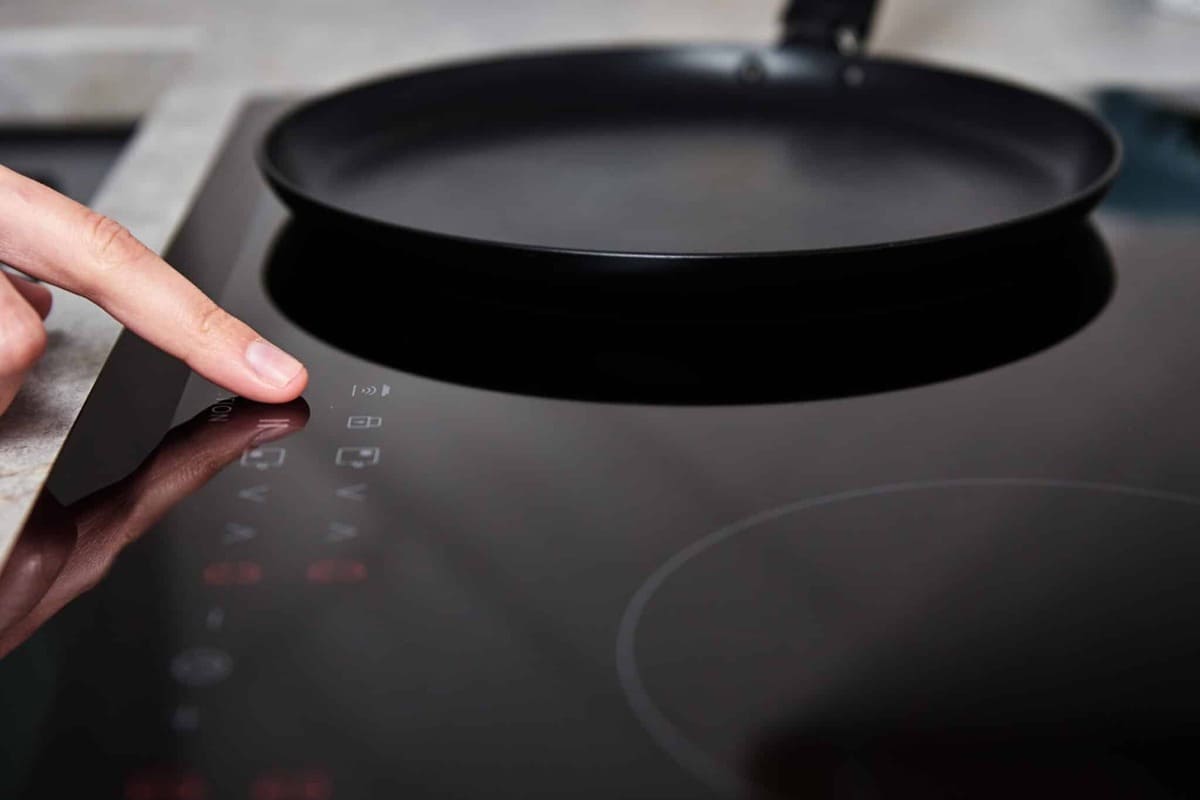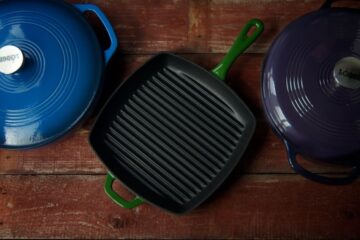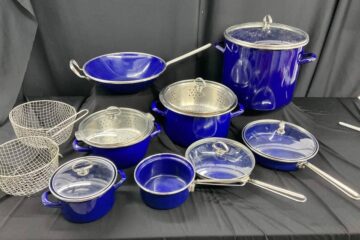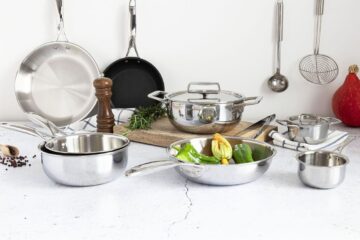Cast iron pans have been a staple in kitchens for centuries due to their durability and versatility. With the rise of induction cooktops, many people wonder if cast iron pans are compatible with this type of stove. Induction cooktops use magnetic fields to heat cookware, so the pan must contain conductive, ferrous metals to transfer heat.
Fortunately, cast iron pans are a great option for induction cooking. The ferrous material in the cast iron makes it compatible with induction cooktops, allowing for even heating and temperature control. However, it is important to note that the rough and porous bottom of cast iron pans can scratch the glass-ceramic surface of the induction cooktop if not handled carefully. With proper care and attention, cast iron pans can be a great addition to any induction cooktop kitchen.
What is an Induction Cooktop?
An induction cooktop is a type of stove that uses magnetic fields to heat cookware. The cooktop itself does not get hot, but instead, the magnetic field creates an electrical current in the cookware, which generates heat. Induction cooktops have become increasingly popular due to their fast heating times, energy efficiency, and precision temperature control.
Induction cooktops are typically made of a glass-ceramic surface, which is easy to clean and provides a sleek, modern look. They come in a variety of sizes and styles, including freestanding ranges, slide-in models, and built-in cooktops.
To use an induction cooktop, you need to have cookware that is compatible with induction cooking. This means that the cookware must contain ferromagnetic materials, such as cast iron or stainless steel, which can be magnetized.
One advantage of induction cooktops is that they are much safer than traditional gas or electric stoves. Because the cooktop itself does not get hot, there is less risk of burns or fires. Additionally, induction cooktops are more energy-efficient than gas or electric stoves, as they only heat the cookware and not the surrounding air.
What are Cast Iron Pans?
Cast iron pans are a type of cookware that has been used for centuries. They are made from cast iron, which is a heavy, durable material that can withstand high temperatures. Cast iron pans are known for their ability to retain heat, which makes them ideal for cooking a variety of dishes.
Cast iron pans come in different shapes and sizes, from skillets to Dutch ovens. They are also available in different finishes, such as bare cast iron or enamel-coated. Bare cast iron pans require seasoning before use, which involves coating the pan with oil and heating it to create a non-stick surface. Enamel-coated cast iron pans do not require seasoning and are easier to clean, but they are more prone to chipping and cracking.
Cast iron pans are versatile and can be used on different types of cooktops, including gas, electric, and induction. However, there are some considerations when using cast iron pans on induction cooktops. The pan must contain conductive, ferrous metals to transfer heat, which makes cast iron a great option for induction cooking. However, the rough and porous bottom of the cast iron pan can easily scratch the glass-ceramic cooking surface of the induction cooktop.
Do Cast Iron Pans Work on Induction Cooktops?
How Does Induction Cooking Work?
Induction cooking uses electromagnetic energy to heat cookware directly, rather than using a heating element to transfer heat to the cookware. The cookware must contain ferromagnetic metals, such as cast iron or some types of stainless steel, to work with induction cooktops.
Why Do Cast Iron Pans Work on Induction Cooktops?
Cast iron pans are made of ferromagnetic metals, making them compatible with induction cooktops. Cast iron is also a great conductor of heat, which means it heats up quickly and evenly. This makes it an ideal choice for cooking on induction cooktops.
What are the Advantages of Using Cast Iron Pans on Induction Cooktops?
Using cast iron pans on induction cooktops has several advantages. First, cast iron pans are durable and long-lasting, which means they can withstand high heat and heavy use. Second, they heat up quickly and evenly, which means food cooks more evenly and efficiently. Finally, cast iron pans are versatile and can be used for a variety of cooking methods, including frying, sautéing, and baking.
What are the Disadvantages of Using Cast Iron Pans on Induction Cooktops?
While there are many advantages to using cast iron pans on induction cooktops, there are also some disadvantages to consider. First, cast iron pans are heavy, which can make them difficult to handle, especially when they are hot. Second, cast iron pans can be difficult to clean, especially if they are not seasoned properly. Finally, cast iron pans can scratch the surface of an induction cooktop if they are not handled carefully.
How to Use Cast Iron Pans on Induction Cooktops?
Preparing the Pan
Before using a cast iron pan on an induction cooktop, it is important to make sure the pan is properly prepared. The bottom of the pan should be smooth and free of any rough spots or bumps that could scratch the cooktop surface. One way to achieve this is by sanding down the bottom of the pan with sandpaper or a sanding block.
It is also recommended to season the pan before use. This involves coating the pan with a thin layer of oil and heating it in the oven to create a non-stick surface. Seasoning the pan will not only prevent food from sticking but also help protect the pan from rusting.
Heat the Pan Properly
When heating a cast iron pan on an induction cooktop, it is important to start at a low temperature and gradually increase the heat. Cast iron pans retain heat well, so they can get very hot very quickly. Starting at a low temperature will prevent the pan from overheating and scorching the food.
It is also important to use a pan that is the appropriate size for the cooktop burner. Using a pan that is too small or too large can result in uneven heating and hot spots.
Cooking with Cast Iron Pans on Induction Cooktops
Cast iron pans are great for cooking on induction cooktops because they are made of conductive, ferrous metals that transfer heat efficiently. They are especially good for searing and browning meat because they can get very hot and retain that heat well.
When cooking with a cast iron pan on an induction cooktop, it is important to avoid sliding or dragging the pan across the surface. This can scratch the cooktop and damage the pan.
Cleaning the Pan
After using a cast iron pan on an induction cooktop, it is important to let the pan cool completely before cleaning it. Once the pan has cooled, it can be cleaned with warm water and a mild detergent. It is important to avoid using abrasive cleaners or scrubbers that could damage the seasoning on the pan.
It is also recommended to dry the pan thoroughly and apply a thin layer of oil to the surface to prevent rusting.
Conclusion
In conclusion, cast iron pans are great for use on induction cooktops. Cast iron is a ferromagnetic material, which means it can be magnetized. This property makes it ideal for use on induction cooktops, which use magnetic fields to heat cookware. Cast iron pans can transfer heat effectively, which means they can cook food evenly and thoroughly.
When using cast iron pans on induction cooktops, it is important to preheat the pan for an adequate amount of time. This will ensure that the pan is evenly heated before adding food. It is also important to use a lower heat setting than you would on another type of cooktop, as induction cooktops can heat up quickly. Holding the pan in place during cooking can help prevent scratching the glass top of the cooktop.
Overall, cast iron pans are a great investment for any kitchen, especially if you have an induction cooktop. They are durable, versatile, and can last for generations with proper care. With the right seasoning and maintenance, a cast iron pan can become a treasured family heirloom.



